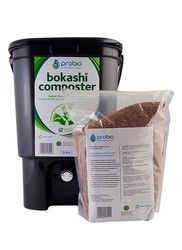Description
How does the Bokashi Indoor Composter work?
The system uses beneficial microbes in the bokashi to FERMENT organic waste as it accumulates in the composting bucket. The bucket fits easily under most kitchen sinks, so it is convenient to access - right when you need it.
Fermentation (or pickling) retains all the energy (no heat loss) and most of the nutrients in the waste with no foul odor normally associated with food waste.
What is Bokashi?
Bokashi is naturally fermented bran that is primarily used for composting. Ingredients include wheat bran, rice bran, purified and structured water, sugarcane blackstrap molasses, mineral rock salt and SCD Probiotics Technology. Bokashi allows for an odorless composting system, speeding up the fermentation process of food waste. When the fermented food waste is added to the soil, it breaks down completely and adds valuable nutrients to lawns and gardens.
How long does Bokashi last?
Bokashi can last for years. There is no expiration date. The wheat bran and drying process allow the microbes to become dormant until they are introduced to their ideal environment and food source. Keep tightly closed for maximum effectiveness.
How do I know if my Bokashi has gone bad?
If there is green, blue, black or brown mold on the bokashi, this indicates putrefaction, and it should be thrown out. However, if kept sealed and with minimal exposure to oxygen, Bokashi will last for years. (Not resealing your bag after you use it may cause a white mold to grow. This mold does not mean your Bokashi is bad. Continue to use as directed.)
I saw some white growth on the surface of my compost. Has my compost gone bad?
No. This is a good indicator that the fermentation is in progress. White mold is a sign of beneficial bacteria. Continue to use as directed.
Can we compost during the winter season?
Yes. In many areas of the world, the ground is too frozen in winter to bury the compost directly in the soil. There is an option. The secret is keeping the compost moist. Cover the entire compost pile with a thick sheet of clear plastic. Not only will it heat the compost pile, it will also prevent rain from leaching all the nutrients out of the pile. You can also insulate the pile with a foot or more of hay or straw instead of plastic, if you can protect it well enough to keep it moist.
My compost (food waste) has retained some of its original, physical properties. Can I still bury it in the ground?
Yes. The fermenting food waste in the Indoor Composter will retain much of its original physical properties but will have a pickled appearance. Complete breakdown of material will occur once it's transferred into the soil and has been in the soil from two weeks to two months - depending on climate and soil conditions.
The waste hasn’t broken down in the bucket. Is something wrong?
The waste will NOT decompose while in the composter - it will only ferment (or pickle). If you can imagine a pickled onion - it will still look like an onion, but because it’s pickled, it will have changed its internal structure. The single criterion to determine if the process is working is the odor. If there’s no rotting odor, then the fermentation process is working. The physical decomposition of the waste only occurs when the material goes into the soil. Here, it breaks down very quickly because the material has been pre-conditioned (i.e. fermented).
What do I do with the “compost” tea that I drain from the bottom of the composter?
This liquid is teaming with microbes and nutrients! After you dilute the tea, you can use it directly on your garden or potted plants. Or, you can add the liquid to the toilet or a septic tank. The microbes will work to make the septic system more efficient. One other use is to simply pour it down the sink. The microbes will go to work on your drains and keep them clean.
How much should I dilute the “compost” tea?
The correct ratio is 1 tablespoon per gallon.
When the compost is buried in the soil, will foxes and other wild animals be able to smell it and dig it up?
